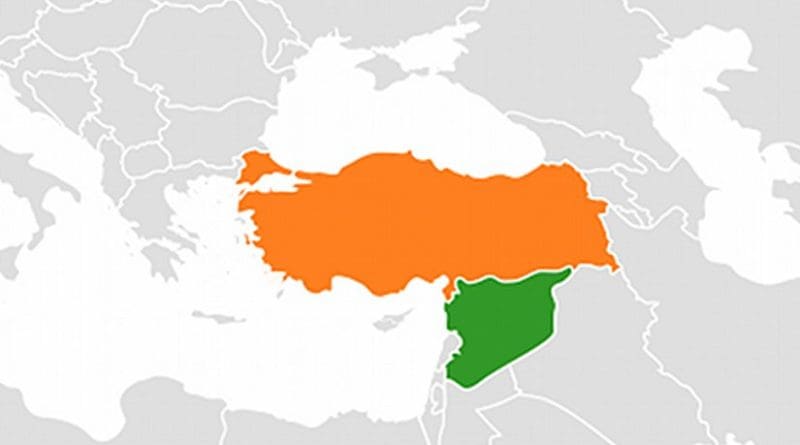Iran’s Choice: Turkey Or Syria – Analysis
By European Foundation For Democracy
In recent years, the Turkish foreign minister Ahmet Davutoglu has made no secret of his pro-Iranian stance. Now it is Iran that is putting pressure on Turkey. Iran says that the Turkish government should alter its political stance on Syria. In fact, in recent months Turkey has been granting Syrian refugees asylum, whilst on the other hand there have been reports of assistance from Iran’s revolutionary guard in repressing Syria’s pro-democracy movement.
By Wahied Wahdat-Hagh
Iran believes that the change currently afoot in the Islamic world is just a sign of the “Islamic awakening.” For this reason, those holding power in Iran view the “Islamic Republic of Iran” as a model end state for the change underway in the Arab world. Even as recently as 1st June 2011, Iran’s revolutionary leader Ali Khamenei labelled the Syrian opposition a “deviant movement.”

On 11th July 2011, Turkish foreign minister Davutoglu travelled to Tehran. Amongst those he met was Iranian president Ahmadinejad. A discussion took place highlighting the need to improve Iran’s economic ties. Furthermore, Iranian politicians denounced “Western influence” in the region. On 18th July 2011, “Sobesadegh,” a wing of Iran’s “Guards of the Islamic Revolution” – better known as the “Revolutionary Guard” – published an article showing the Turkish foreign minister’s visit in a new light. In this article, Iran’s “Revolutionary Guards” warned the Turkish government to change their stance on Syria. They criticised the fact that both Iranian politicians and Turkish foreign minister Davutoglu discussed in very “general terms” at a Tehran press conference. In fact, the Turkish-Iranian talks brought no concrete results.
And what do Iran’s “Revolutionary Guards” think of Syria? They believe that Assad’s government constitutes an exception. They claim that whilst almost all Arab governments have been touched by the change afoot in the Arab world, with most of these falling due to their “pro-Western” policies, Syria is “an exception.” Syria is counted amongst the “ranks of resistance,” they say. This, they add, is why the West and many Arab governments are against Syria. The USA and Saudi Arabia, which the Guards claim to be particularly “damaged” by the “Islamic awakening”, have, according to them, paid Syrian opposition figures to challenge the Assad government. They say that Syria has nothing in common with Egypt, Tunisia, Libya and Yemen. They even claim that the West is desperate to topple the Syrian government, as a “pro-Western government in Syria would alter the regional balance of power in the West’s favour.”
However, the Revolutionary Guards also claim that the Turkish government is taking a highly negative approach to Syria. They claim that the Turkish government allowed weapons destined for the Syrian opposition forces to pass into Syria via its border with the country. “Sobesadegh” writes that “The Turkish government’s sole argument is that the Syrian opposition figures belong to the people.” The Revolutionary Guards say that the Turkish government refused to answer the question as to why the Syrian people would need such weapons to kill government officials. At the same, they note that millions of Syrians have poured onto the streets to support the Syrian government.
“Sobesadegh” writes that “Syria’s problems are closely linked to Iran’s interests.” Foreign Western forces must stop interfering in Syria’s internal affairs, they say. They add that Turkey should pursue a more “realist” policy, in which they defend the Syrian government. They claim that Turkey can only reach its goals through a pro-Syrian policy. They add that in the case that Turkey continues its “anti-Syrian” policy, Iran will be forced to choose between Syria and Turkey. Here, notes the political wing of the Revolutionary Guards, Iran would choose Syria over Turkey for strategic reasons.
The weekly newspaper “Sobhesadegh” also quotes high-ranking Egyptian Brotherhood member Kamal Halbavi, in a further article of 18th July 2011. This article clearly demonstrates the goals being pursued by the pro-Iranian axis in the Middle East. Halbavi differentiates between “false” and “true” leaders of the Islamic Nation (Ummat). He believes that Ali Khamenei is an example of a “true leader.” His reasoning: a false leader would show interest in securing peace with Israel, whilst the “true leader” would rule this out.
The fact is that Iran can only achieve its anti-Israeli, anti-democratic and anti-Western goals with the help of the Lebanese Hezbollah, Hamas, the Egyptian Muslim Brotherhood and Syria.
Meanwhile, the Iranian Pseudo-Parliament voted for a boycott of the US on 20th July 2011. They claim that 29 US citizens should be prosecuted internationally for “human rights abuses.” This demand also constitutes the basis of Iranian conditions for direct Iran-US negotiations. It was no less than Hashemi Rafsanjani who said, after this decision that Iran “can now negotiate with the US on a level playing-field.”
Wahied Wahdat-Hagh is Senior Fellow at the European Foundation for Democracy in Brussels.


I think for one, there is no tension between Iran and Turkey over Syria. It’s just they have disagreements like Israel and the US. However, their relationship is strong and turkey has realised that it needs Iran morethan it needs the US and Israel because all the US can do for Turkey at this stage is to drag them into more wars and destruction. There are economic/Aid benefits. On the other hand, their relationship is flourishing rapidly on all fronts, including economic.
When it comes to syria, it is important to note that the west is indeed supporting Syrian dissedents as disclosed by Wikileaks. The US and allies can no longer fool anyone – not even their own Turkey.